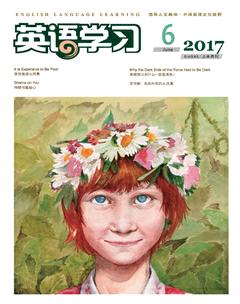单身女性如何改变社会?
By+Regan+Penaluna
Bella DePaulo never fantasized1 about a dream wedding or being a bridesmaid. Instead, she saw herself as “single at heart,” pursuing intellectual refinement, friendship, and solitude as a young psychologist.2 Still, she had internalized3 the popular idea that married people were happier and healthier than the unmarried, and took her own pleasant experience to be exceptional. That is, until she looked into it, and found the claims about the “transformative power of marriage” to be, she says, either “grossly exaggerated or totally untrue.”4 From then on, shes focused on how singles actually live.
Now at the University of California, Santa Barbara, DePaulo has written widely about how marriage and the nuclear family are making way for other social arrangements.5 Shes not fooled by shows such as The Bachelor 6 or romantic comedies that end with a storybook wedding proposal. Those narratives exist, she says, “not because we as a society are so secure about the place of marriage in our lives,7 but because were so insecure.”
At least one cause of that insecurity is the empowerment of single women, which she writes about in her book, Singled Out: How Singles Are Stereotyped, Stigmatized,8 and Ignored, and Still Live Happily Ever After. In this article, DePaulo discusses how single women are transforming social and political life, how theyre settling down, and what that says about living happily.
Could the end of traditional marriage and nuclear families be a good thing?
I think it is a tremendously positive thing. Once upon a time, just about everyone in the United States thought that they needed to squeeze themselves into the heterosexual9 nuclear family box, even if they werent heterosexual or werent interested in getting married or had no interest in raising kids. Now, people can create the lives and the families that allow them to live their best, most authentic10, and most meaningful lives. They can choose to put friends at the center of their lives. Or they can assemble their very own combination of friends and family to be the social convoys that sail beside them as they navigate their lives.11 They can have kids in their lives without having children of their own. They can live under the same roof with friends or families or children or any combination. They can live in a place of their own, but within an intentional community, such as a cohousing community.12 They can share a duplex13 with a friend or relative, so that they have their own space while also having someone else they care about just steps away. Or they can live entirely on their own. The possibilities are endless.
What determines how a single woman chooses her living arrangement?
It depends on life stage14, but it also just varies by preference. Some people like me really like having their own space, so love living alone. But there are other single people who really like being with other people a lot of the time, so they might want to live under same roof, like a Golden Girls15 kind of thing. Also, single mothers are great at finding innovative ways of living as single parents. One of the people I interviewed, Carmel Sullivan, was devastated16 after her divorce. She felt so lonely. And then she put out an ad saying that she wanted to share a place with another single mother and her kids, to help each other raise the kids and have friendship. She got all the responses and ended up starting this online platform called CoAbode, where single mothers can find other single parents to share a home with. When I talked to Carmel a few years ago, she already had 70,000 single mothers signed up.
Is having more living arrangements to choose from fundamental to happiness?
Yes, I think it really is. And that is really what is so different about the way were living now is that we have more options than ever before to choose the life we want. Of course we are constrained17 by whatever resources and money we have, but I found in writing my book How We Live Now, that even people who were very constrained in their finances could still find a very satisfying life to live.
A number of books have recently come out touting single women, such as Kate Bolicks Spinster,18 and Rebecca Traisters All the Single Ladies. How will single women shape the future of society?
Their impact on politics could, in theory, be tremendous. By staying single when marriage is still idealized, single women are already pushing back against conventional expectations and constraints, creating 21st-century connections and intimacies beyond the old nuclear family model.19 They vote overwhelmingly democratic.20 So the democrats should be beating down their door21, promising to wash their cars, watch their kids. But they dont vote typically in the same proportions that married people do.22 I think theyve been so left out of the process by the way politicians talk about single women, the way they leave them out of the conversation when they talk about families.23 As a single woman, I want a choice about which role I want to fulfill. If I had to be a wife, I would go stark raving mad24. So having a role can be very important, but we dont all fit into the same roles.
1. fantasize: 幻想,想象。
2. refinement: 精进;solitude: 独处,独居。
3. internalize: 使(感情、态度、信仰等)成为思想的一部分,使内在化。
4. transformative: 变革性的;grossly: 很,非常;exaggerated:夸张的。
5. nuclear family: 核心家庭,指由夫妻及其未成年或未婚子女组成的家庭;make way for: 给……让路,腾出地方。
6. The Bachelor: 《单身汉》,美国交友约会真人秀,每季都会有一位单身汉和多位单身女性进行浪漫约会,最终从中选择一位作为妻子人选。
7. narrative: 故事,這里指童话故事里宣扬的美满婚姻;secure: 自信的,有把握的。
8. empowerment: 增加自主权,掌握自身命运;stereotype: 对……产生成见,把……模式化;stigmatize:使感到羞耻,被安上罪名。
9. heterosexual: 异性恋的。
10. authentic: 真实的,可靠的。
11. 或者他们可以自己组合朋友和家人,在未来的人生路上为自己保驾护航。assemble: 召集,聚集;convoy: 护航,护卫队。
12. intentional community: 理念社区;co-housing: 共同住宅,理念社区的一种类型,由私人住宅及广大的共用空间组成,居住者们共同规划和管理,并保持频繁的交流与互动。《纽约周刊》曾这样描述这一理念:“能让人们拥有自己的温暖窝,但不会和外界疏离,不会感到在冰冷的城市中迷失。”
13. duplex: 复式公寓。
14. life stage: 人生阶段。
15. Golden Girls: 指1985年制作的系列美剧《黄金女郎》(The Golden Girls),讲述了几位已到古稀之龄的女士同住一个屋檐下的故事。
16. devastated: 崩溃的,伤心欲绝的。
17. constrained: 受约束的,被压抑的。
18. tout: 吹捧,吹嘘;spinster: 未婚女子,老姑娘。
19. 当婚姻仍被理想化时,单身女性已经开始通过独自生活的方式向传统的期望和约束做出反击,在旧式核心家庭之外建立起21世纪的新型人际和亲密关系。
20. 她们普遍支持民主党。overwhelmingly: 压倒性地。(美国的女性选民中,高知女性和未婚女性尤爱民主党。前者作为性别歧视的受害者,喜欢民主党平等和进步的政策;而后者包括大量的单身母亲,由于经济方面的原因,依赖于民主党所支持的社会福利政策。)
21. beat down ones door: 砸破门,指蜂拥而至。
22. 但一般来说,她们参与选举投票的人数比例却没有已婚人士多。
23. 我觉得她们(单身女性)在选举投票过程中之所以不被重视,是因为政客们谈论她们的方式,即在谈论家庭时忽略了这部分人群。
24. stark raving mad: 完全疯狂的。

